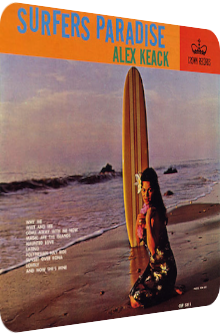
Alex Keack
Surfers Paradise
1961
"Everything must go!" That's the credo in terms of the archival stuff and the colorful hodge-podge of Crown Records, a low-budget label that reached its climax in the 50's. While I generaly admire the approach of making available a lot of their back catalog in digital form, things can go awfully wrong, for instance in regard to the album Bongo Madness which was presented by Don Ralke. Or take Milt Raskin's must-have Exotica classic Kapu into account. Or is its name really Kapu? Isn't it called Exotic Percussion? Or even Exotic Sounds Of Hawaii? Yes, the album really goes by various names (and I've omitted at least another title on that list) as well as tedious track titles and different sound qualities.
Enter Alex Keack and his 1961 album Surfers Paradise. Originally released on Crown Records too, the album can be considered an Exotica masterpiece as well. The re-issue tactics, alas, remain the same. The album is also available under additional titles: For Surfers Only and the highly inappropriate Hawaii Goes Latin. Seriously, what the hell is going on with the renaming scheme? There is nothing Latin on the album. There isn't even a glimpse of Surf Rock on it, either. Before I spoil all the fun, though, let's focus on the positive aspect, namely the fact that the album is readily available. Alex Keack, an ex-member of The Islanders, delivers a colorful, rather intimate album with three anonymous musicians.
The back side of the original album sleeve doesn't contain any enlightening information about them, but is overloaded with advertisements for other releases on the Crown Records label. This is not real surf music, which really took off in the middle of the 60's, but boldly romantic Exotica in the style invented and mastered by Martin Denny and Arthur Lyman. It has a distinct style nonetheless. The album is strictly coherent, laid back and care-free. It features entirely original material, and the coolness factor is less important than the cozy, mellifluous settings of beaches, distant islands and sunray-laden bays. Read below why Surfers Paradise is a one-time success for Alex Keack and should be in the Guinness Book of Exotica Records for its coherent presentation.
It's rather hard to write a detailed track-by track review of Surfers Paradise – less than ten people have done it before, I believe – because if there is a coherent Exotica album with no instrumentation- and style-related surprises, this album is it! Why Me starts with a tropical groove loaded with bongos and maracas. The depth of the recording is already perceptible, and the short reverb of the bongos is great. A Polynesian flute melody is played, and it is rather unexpected that many of its parts are played in minor, a key you don't hear that often in Exotica music. The piano is soothing, and the glistening xylophones plus their sustain at the end of the track add a lightness that is atypical for Surf Rock – which makes me confident in my opinion that Keack delivers a dreamy depiction of the surfers' life and is totally reluctant of the coolness factor. And so the album goes on, never strolling far off its path.
Wait And See is another melodious track with a cowbell-like percussion and a melody that is played by two instruments at once, a flute and a piano, while on Come Away With Me Now, Keack and his band use the same trick by playing a totally laid back melody on piano and flute, but the percussion is turned up a notch. A track also worth mentioning is Haunted Love. It is the first but also the last song of side A that spices the formula with quicker percussion, although the melody is again hummable as usual. An interesting rhythm shift occurs in the middle when the song moves into a bossa nova. A great and slightly surprising track.
Latino marks the beginning of side B, and indeed, the piano backings transport those Latin keys, but the soothing flute-vibraphone combo evokes a tremendously dreamy atmosphere that simply doesn't have anything in common with either schmaltzy or hot-blooded Latin rhythms. While Polynesian Hay Ride focuses on quick percussion, Sunset Over Kona has a simple flute melody that is highly euphonious and perfectly hummable, thus making this the most successful track for me. And Lonely concentrates on the joyful aspects of being alone, thinking about the beautiful beaches and the reflection of the surfer's inner voice. Yep, this is the pre-New Age anthem of the Exotica genre, and yet it's perfectly integrated into the album.
Surfers Paradise is either the perfect Exotica album – or the most flawed one. The album is a prime example of coherence. The style is carved in stone. It doesn't change. There are only 3–4 percussive devices, a piano, two mallet instrument and a flute. No claves, no temple gong, no gourd and not even a surf guitar can be found. But the melodies are so good and mellow, the atmosphere is dreamy and remains the same in all of its tracks. Yes, this seems to be a record that was created to cash in during the jump of the Exotica bandwagon. It is limited in its use of instruments and its scope due to budgetary reasons, for Crown Records couldn't operate in the scope of, say, Capitol Records. But for once, less is more! Keack doesn't take you on a journey, he rather invites you to stay in one place for a few minutes.
While there are hundreds of – fantastic! – Exotica records that try to outgun their brethren by featuring more and better and stranger exotic instruments, Keack's unique songs are so similar to each other that it is a joy, or an annoyance if you want to be surprised about every new track. There is another pure Exotica album that is similarly coherent, though it oscillates between Far Eastern and Occidental melodies: Rex Kona & His Mandarins' Wild Orchids. In the end, I'm carefully recommending this album, depending on your viewpoint of Exotica. Do you long for variety or a streamlined album experience? And are you d'accord with a supposed surf album that isn't cool and sleazy, but romantic, dreamy and kind of introverted? I do embrace Keack's style very much, and since the album is easily available on iTunes, prelisten to it. Once you know one song, you know them all. Or how about rephrasing that: once you like a song, you like them all.
Exotica Review 056: Alex Keack – Surfers Paradise (1961). Originally published on Apr. 14, 2012 at AmbientExotica.com.
